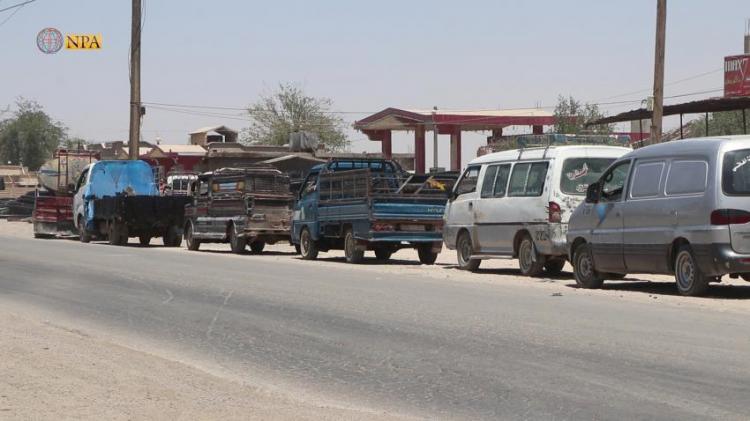Fuel crisis and disparity in allocations in one of Syria’s richest oil regions
Deir ez-Zor – North-Press Agency
Jindar Abdulqader
The local people of Deir ez-Zor, the richest oil region in the east of Syria, suffer a shortage of fuel that enables them to provide their electricity in the absence of a regular electric current in most of its areas, in addition to the need of fuel for the agricultural sector in to supply generators and irrigation stations that drag water from the Euphrates to the agricultural lands.
The region witnesses smuggling of fuel on the banks of the Euphrates river which extends to more than 250 km, ranging from Al-Jazzarat to Al-Bahouz on the Syrian-Iraqi borders, by some influential dealers in the region, in light of fuel lack in the eastern countryside of Deir ez-Zor, the matter met with public condemnation.
People of Deir ez-Zor, who live in areas controlled by the US-led Syrian Democratic Forces (SDF), depend in their movement on cars and motorcycles due to the long distances among their areas estimated at more than 16.000 Sq. km, and populated by more than one and a half million people.
The marginalization of Agriculture
The fuel department of Deir ez-Zor Civil Council receives dozens of trucks (diesel tanks where the capacity of each is 40,000 liters of fuel) every three weeks and distributes them to gas stations located in the large cities and towns in the region only, the residents get it by SYP 55 (approximately 10 cents) per liter.
Malik Hamshan, a 40-year-old farmer from the village of Mheimida, while waiting in a long queue in front of a gas station, saying that the fuel is available for the vehicles, despite the crisis and the long queues, pointing out that there are no allocations for their agricultural engines.
Hamshan explained that the local council had provided fuel for agricultural associations which registered to irrigate crops to provide the region’s needs of vegetables and fruit.
For his part, Khaled Al-Hassan, supply manager at People’s Municipality in Mheimida told North-Press that the quantities they receive are sufficient to meet the need of the vehicles, summarizing the crisis that there are no allocations for owners of private agricultural machinery.
disparity of Allocations
The services provided by Deir ez-Zor Civil Council vary between the western and eastern countryside, it’s evident in a visit to the region that the situation services in the western countryside are different, unlike the eastern countryside which still needs more support because of the large damage of the infrastructure, especially in the regions of Hajin, Abu Hamam, Al-Sousah, Al-Shaafah, Albo-Khater, and Albo-Hassan.
The controlled areas by SDF in early 2018 such as Al-Buseira, Al Shheell, and Thaiban are still marginalized in terms of services compared to the western countryside.
There is a disparity in fuel allocations in both eastern and western countryside of Deir ez-Zor, where the distribution of fuel for residents comes in the form of daily allocations that vary from one region to another through lists including the driver’s name and the car’s plate.
In the western countryside, the quantities range between 25 to 30 liters for small cars and up to 80 liters for large vehicles, which meets the needs of people of that region until the second batch, while in the eastern countryside, only 20 liters are allocated for small cars, 40 liters for large vehicles, which leads the people to buy fuel from the owners of refineries (burners) at prices starting from SYP 140 to 180.
Administrative fault
Mohammad Al-Bashir, the co-chair of the Economic Committee in Deir ez-Zor Council, admitted that there is a fault in the mechanism of distributing the fuel where he justified that those areas had recently joined the previously controlled areas by Deir ez-Zor Military Council, and thus, had recently entered into the administrative plan.
Al-Bashir pointed to the fuel crisis in the region, saying that people are forced to buy fuel from owners of refineries at high prices due to the lack of the allocated amount, which leads to high prices of electricity, bread and transportation costs.
The official in Deir ez-Zor Civil Council stated that the smuggling of fuel between the two banks of the Euphrates is still continuing, citing that with the “wide area linking them with the Syrian regime forces”, and considered that these operations came because of a fault by some departments operating under the umbrella of Deir ez-Zor Civil Council, which works to address these faults, as he described.
He demanded to raise the quantities allocated to Deir ez-Zor by Sadcob Fuel Company and to provide refineries that produce these materials at high quality.

